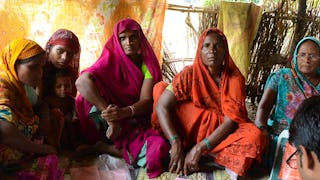This course is part of a Specialization titled “Strategy and Finance for a Lifecycle of a Social Business”. The beauty of a modern decision-making framework is that it can be used to understand value creation at any level – the individual or business or societal. The applications however become increasingly complex as your lens expands from the individual to the corporate/nonprofit to the global society.
通过 Coursera Plus 解锁访问 10,000 多门课程。开始 7 天免费试用。


Financial Markets and Instruments
2,527 人已注册
包含在 中
您将学到什么
How to price and invest in bonds and stocks
您将获得的技能
要了解的详细信息

添加到您的领英档案
4 项作业
了解顶级公司的员工如何掌握热门技能

积累特定领域的专业知识
- 向行业专家学习新概念
- 获得对主题或工具的基础理解
- 通过实践项目培养工作相关技能
- 获得可共享的职业证书

该课程共有6个模块
The Specialization is part of a program designed for an audience interested in working for, or creating, social businesses and anyone who wants to use modern frameworks and tools to understand how value is created for an individual, a company and social business. Since social businesses take on inherently more complex missions - by design, they are set up to address social issues - the task of understanding and evaluating opportunities aimed at addressing social issues requires a deeper understanding of the strengths and weaknesses of modern frameworks and tools. Arguably, all businesses try and impact society. This is the main reason why the Specialization has both analytical rigor and real-world applicability. My hope is that by the end of the Specialization we will be ready to evaluate, understand, and even create social businesses. This is a journey that will start with value to an individual and then gradually understand value created by regular businesses and, finally, tackle value creation by a social business. We will however not wait till the end of the Specialization to start thinking seriously about how social businesses are distinct from regular businesses. The good news is that you have already been exposed to a great course on social business – with world-known experts sharing their views, followed by an engaging and framework-based approach to consider how to identify a social problem and then develop an approach to addressing it using a multi-stakeholder approach. To motivate folks to understand the complexity of evaluating a social business, I will start by sharing some publicly available articles on what popular thinking is about social business, on how to measure social value and some real-world examples. I will do so gradually over the four courses, without testing, but with reflection exercises built in at the beginning and the end of each course. I have managed the Social Venture Fund (SVF) at the University of Michigan for over a decade now and we evaluate and invest in social businesses. I also recently launched the International Investment Fund (IIF) in India that evaluates, supports and invests in small- and medium-sized businesses. I will share cases written by me and my students related to this work, but please do not distribute them. The purpose of the reflection exercises is meant for you to gradually gain exposure to the complexities of social businesses and measuring social value. You are not expected to be able to value the businesses described in the cases, but to keep them in mind and reflect on the frameworks and tools you are introduced to and their applicability to decision-making in social businesses. While you will not be tested on specifics in the reflection portions of this Specialization, maintaining a personal journal on important issues throughout the Specialization will really help so you prepare for the challenging work on the project on a social business following successful completion of the Specialization. You will hopefully realize that the framework and tools provided in the Specialization will not only help you in any business, but also are the same for a social business. You will hopefully realize that, at the end of the day, it is all about intent and what you produce/provide and to whom and how. And what is readily measurable and verifiable may be one of the key differences between a regular and a truly social business – everything, eventually, is about quantity times price of what you have to offer. Most businesses focus on producing goods and services that have readily available markets and therefore prices. Perhaps the key difference in understanding and managing a social business versus a regular business is its focus on issues beyond an individual and a desire to provide goods and services that are not priced and therefore rewarded by free markets because they benefit society and cannot be captured by corporations. This, in turn, makes a social business all the more challenging to create and manage.
涵盖的内容
1篇阅读材料
This module contains detailed videos and syllabi of both the Specialization and the third course. This Specialization has been designed to enable you to learn and apply the powerful tools of modern finance to personal, corporate and social businesses. In fact, this frameworks and tools can be applied to decision-making in any context, including nonprofit and governmental initiatives to tackle the simplest to most challenging issues we confront individually or collectively. The courses within progress linearly and build on each other and it is important for you to get an understanding of why this Specialization may be relevant to any context. Please review the videos and syllabi as they will give you a sense of the Specialization and how this specific course fits within. My teaching style and philosophy are also presented to you (hopefully) in sufficient detail. I believe education is the key to addressing the challenges that we face across the globe. Most importantly, all this content is meant to give you enough information to enable you to make a decision about whether you want to take this Specialization, or this course by itself. To make sure you have the social lens in mind, we have also created a course that focuses on social business that you must take before this Specialization. This will hopefully make you think about what a social business looks like and, importantly, how it differs from standard business. A deeper realization of this can only occur when you are able to recognize how value is created by regular businesses. This will be a slow process that is hopefully already in motion and your understanding will deepen by the end of this Specialization so that you are ready to work on a social business.
涵盖的内容
5个视频1篇阅读材料
This third course is an introduction to markets and two financial instruments, bonds and stocks, and how they are valued using the principles of time value of money covered in the two preceding courses in this specialization. The main purpose of this course is to serve as a bridge to figuring out the risk and return that individuals or businesses must use to figure out the value of any decision. While the return on any decision is ultimately determined by its risk, bond and stock markets enable the determination of the risk and return. This may be the biggest social value created by markets. Since individuals and households ultimately provide capital to both governments and businesses though the market, this course will also serve useful for personal financial decision-making.
涵盖的内容
4个视频3篇阅读材料
After understanding both the terminology of bonds and their pricing, we will spend this module both looking at real data to see the close connection between the concepts and reality and submitting the first graded assignment. One of the major takeaways of this week's efforts will be the similarity between how borrowing works for individuals and corporations.
涵盖的内容
3个视频2篇阅读材料2个作业
In this module, we will provide you an exposure to the characteristics and the valuation of stocks, again with an eye toward real world applications. You will see how understanding stocks is key to learning how companies work and how pricing them is more art than detailed calculations.
涵盖的内容
4个视频1篇阅读材料
We will wrap up this course by understanding the relationship between basics of stock pricing and real stock markets. The idea here is to make you realize how foundational principles of finance are so applicable to the real world and even a basic knowledge of key principles help you understand how the world works. You will also test your knowledge by submitting the second assignment for the course.
涵盖的内容
2个视频2篇阅读材料2个作业
获得职业证书
将此证书添加到您的 LinkedIn 个人资料、简历或履历中。在社交媒体和绩效考核中分享。
位教师


从 Finance 浏览更多内容

Yunus Social Business Fund Bengaluru

Yunus Social Business Fund Bengaluru

Yunus Social Business Fund Bengaluru

Yunus Social Business Fund Bengaluru
人们为什么选择 Coursera 来帮助自己实现职业发展




学生评论
11 条评论
- 5 stars
91.66%
- 4 stars
8.33%
- 3 stars
0%
- 2 stars
0%
- 1 star
0%
显示 3/11 个
已于 Oct 23, 2022审阅
This is very good and appreciable to give the credits as a certificate want to learn more and gain knowledge from this platform
常见问题
You can do this course standalone or as part of the online Specialization.
To access the course materials, assignments and to earn a Certificate, you will need to purchase the Certificate experience when you enroll in a course. You can try a Free Trial instead, or apply for Financial Aid. The course may offer 'Full Course, No Certificate' instead. This option lets you see all course materials, submit required assessments, and get a final grade. This also means that you will not be able to purchase a Certificate experience.
When you enroll in the course, you get access to all of the courses in the Specialization, and you earn a certificate when you complete the work. Your electronic Certificate will be added to your Accomplishments page - from there, you can print your Certificate or add it to your LinkedIn profile.
更多问题
提供助学金,



